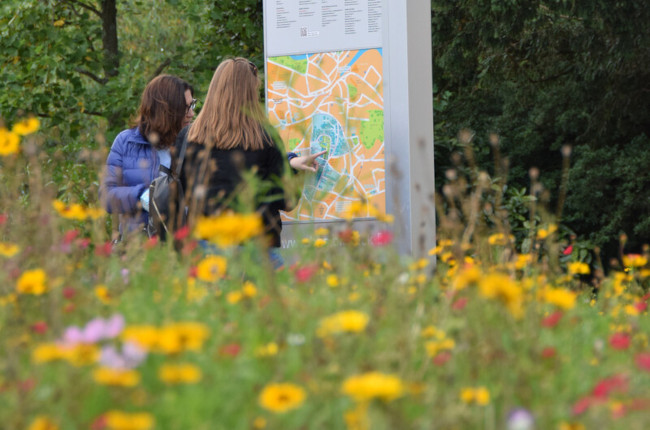The World We Live In: Environment and Sustainability - units 2025/26

Concern for the environment, climate change, and developing more sustainable lifestyles, cities, and industries has taken central stage around the world in a single generation. These are not issues solely for scientists, but for all of us, and for each academic discipline. This study theme brings together units from the Sciences, Social Sciences, and Arts to investigate the world we live in and explore how we might engage with it more sustainably.
You will find units on:
- environmental literature & philosophy
- environmental science & using data
- pollution, resource management, sustainable technologies
- policy-making & education
- social justice & activism
This theme is available for General Pathway students. You can choose as many (or as few) units from this study theme as you like. There are no requirements to pick units only within this list.
Pre-requisites
- Year 1 – units suitable for all students, though you should have at least some secondary school background in Science for Earth Sciences (EASC) units.
- Year 2 – for students with some university study in a relevant discipline (see below for details of the related discipline for each unit. For Earth Sciences, this includes Chemistry, Biology or Physics).
- Year 3 – for students with a strong background of study in a relevant discipline (see below for details of the related discipline for each unit. For Earth Sciences, this includes Chemistry, Biology, or Physics).
Feature units
-
City Futures: Migration, Citizenship, and Planetary Change - UNIV10005 (TB1)
What does it mean to be a Global Citizen? To be part of a global community? These are the kinds of questions you’ll explore in this unit.
-
Our Habitable Planet - EASC10014 (TB1)
Understand the science of how energy, water and elements move around the Earth, and the current environmental challenges we face. Requires secondary school Chemistry.
-
Ideas and Society: Rethinking Nature - AFAC20009 (TB1)
Explore the ideas that have been influential in the history of human society, with particular focus on those relating to nature.
Year 1
Pre-requisites: suitable for all students, though EASC units require some secondary school background in Science.
Teaching Block 1
- Dynamic Earth - EASC10011 (Earth Sciences)
- Education, Climate Change and Social Justice - EDUC10008 (Education)
- Our Habitable Planet - EASC10014 (Earth Sciences)
- World in Crisis? - GEOG16001 (Geographical Sciences)
Teaching Block 2
- City Futures: Migration, Citizenship, and Planetary Change - UNIV10005 (University-wide)
- Creative Futures: Tools for Changing the World - UNIV10007 (University-wide)
- Earth’s Evolution - EASC10012 (Earth Sciences)
- Environmental Sustainability and Resources - EASC10010 (Earth Sciences)
- Planetary Sociology - SOCI10013 (Sociology)
- Sustainable Development - UNIV10001 (University-wide)
- Understanding global problems using data: inequality, climate change and the economy - UNIV10008 (University-wide)
Year 2
Pre-requisites: some university study in a relevant discipline (for Earth Sciences, this includes Chemistry, Biology, or Physics).
Teaching Block 1
- Floods and Flows in River Basins - GEOG20027 (Geographical Sciences)
- Geographies of Nature - GEOG20029 (Geographical Sciences)
- Ideas and Society: Rethinking Nature - AFAC20009 (Arts Faculty, open to all)
- The Politics of the Environment - POLI20018 (Politics)
Teaching Block 2
- Environmental Life Chemistry - CHEM20012 (Chemistry)
Year 3
Pre-requisites: strong background of study in a relevant discipline (for Earth Sciences, this includes Chemistry, Biology, or Physics).
Teaching Block 1
- Advanced Environmental Life Chemistry - CHEM30029 (Chemistry)
- Coevolution of Life and the Planet - EASC30086 (Earth Sciences). This unit is taught in weeks 7-12 and not the full semester.
- Oceans and Climate - EASC30071 (Earth Sciences)
- Philosophy and the Environment - PHIL30112 (Philosophy)
- Sustainability - HIST30159 (History)
Teaching Block 2
- Climate Forensics: Greenhouse Gases in the Atmosphere - GEOG30033 (Geographical Sciences)
- Corporate Social Responsibility and Sustainability - EFIM30012 (Business/Management)
- Environmental Physics - PHYS30049 (Physics)
- Environmental Risks and Disaster Risk Reduction - GEOG30041 (Geographical Sciences)
- From Past to Future: Ecology and Rewilding - GEOG30048 (Geographical Sciences)
- Oceans and Climates - EASC30071 (Earth Science)
- Sea Level Rise in a Warming Climate - GEOG30046 (Geographical Sciences)
What you can study at Bristol
Browse other subjects and study themes.
Study Guides
Study Guides are updated every April for the following academic year.

.jpg)
.jpg)